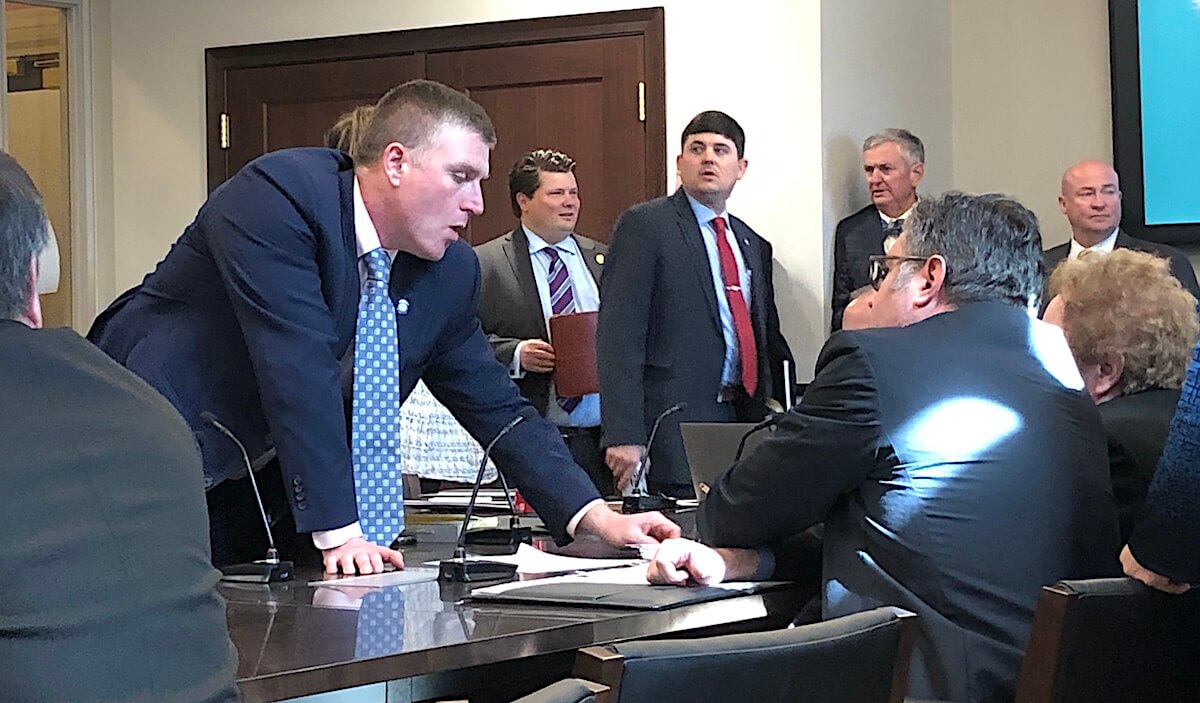
The director of Oklahoma’s Multiple Injury Trust Fund — which pays certain workers’ compensation claims — has been replaced by Gov. Kevin Stitt amid frustrations from legislative leaders over benefit furloughs and what they call poor communication about the issue.
Stitt appointed Stefan Wenzel to lead the typically non-appropriated state agency late Wednesday, replacing Richard Cole, who had served as the MITF’s director since the 1990s.
Although Stitt’s chief of communications declined to discuss the change of leadership, NonDoc reviewed text messages from an administration official who said Cole was “fired” Monday.
Lawmakers had been awaiting a change in MITF leadership as they prepared the Fiscal Year 2022 budget, which contains an additional $6.5 million to address a backlog of claims for existing injured workers and $3 million to seek settlements in pending cases.
“This should take care of the problem,” said House Appropriations and Budget Chairman Kevin Wallace (R-Wellston).
That complicated “problem” has been concerning Wallace for more than two years.
Funded by a portion of workers compensation insurance premiums, a 3 percent tax on claimants’ awards and a 3 percent tax on insurance carriers, the Multiple Injury Trust Fund provides weekly benefits to Oklahomans who have experienced multiple injuries with multiple employers over time, often leaving them unable to work.
In September, the fund notified beneficiaries that it would be unable to provide payments for three weeks in October, an announcement that confounded Wallace and Rep. Chris Kannady (R-OKC), who thought they had addressed the problem in 2019 by appropriating an additional $5 million to settle cases and reduce the MITF’s liability.
Cole, the agency’s long-time director, discussed the situation with Clifton Adcock of The Frontier in September 2020. Kannady, who chairs the House Civil Judiciary Committee and has been the Legislature’s chief negotiator on workers compensation matters in recent years, said Cole did not update legislators before sending the notices and speaking publicly.
“Before he had any conversations with the stakeholders — the Legislature and the governor’s office — about there continuing to be problems, he went to the media and discussed those issues in the media before giving us an opportunity to look for solutions if there were still problems that we thought we had fixed,” Kannady said. “Obviously, for those of us who work very hard to fix issues like that, that didn’t sit well. It didn’t sit well with me.”
As benefit furloughs continued on a quarterly basis, Wallace, Kannady, business leaders and workers compensation attorneys re-examined the situation and negotiated this year’s additional appropriation to the MITF and an extension for an expiring law that allows the fund to receive an additional percentage point’s worth of insurance premium payments.
“I believe this current budget fixes those problems,” Kannady said. “People were not willing to do that for the previous director who, really in our eyes, had stabbed us in the back by the way he had handled the situation.”
Wallace concurred.
“No one likes surprises, especially the Legislature when I have constituents calling and saying, ‘Hey, I can’t pay my electric bill or my rent this month,'” he said. “Hopefully this will be the last time that there has to be money infused in it to fix the situation.”
Cole did not return a voice mail left for him on a cell phone prior to the publication of this story, although it is unclear whether the number may have been for an agency-issued phone. No one answered calls to the Multiple Injury Trust Fund office Thursday morning.
History, details of the Multiple Injury Trust Fund

The Multiple Industry Trust Fund has no oversight board and does not appear to have a website, but a 2016 PDF outlining its duties is hosted on the state’s Workers Compensation Commission website:
In 1943, the Oklahoma Legislature created the Multiple Injury Trust Fund, formerly the Special Indemnity Fund, with a dual purpose: to encourage the hiring of individuals with a preexisting disability and to protect those employers from liability for the preexisting disability. It does so by carrying the responsibility fo ra portion of the benefits if the disabled worker suffers a subsequent injury.
Owing to legislative changes in recent years, the document is out of date, but it does provide a history of the MITF’s “historical funding issues.”
Long-time workers compensation attorney Joe Biscone referred to Cole as a “genius” in terms of how the agency operates.
Biscone said he knew legislators were frustrated with the benefit furloughs, although he emphasized the MITF’s long and complicated history.

“They were a little upset it was going broke. Whether it was legitimate, who knows?” Biscone said. “I don’t really know. We don’t get a chance to look at the books over there. But what hurts is when your clients went three weeks without money.”
Like Wallace and Kannady, Biscone said he believes the MITF’s future should be strong.
“I think the fund is going to be fine, and unfortunately it’s going to look like the new guy did it, and they didn’t. It’s the way it’s being funded that is going to make it successful,” Biscone said. “And you’ve got a bunch of conservative judges over there, so I don’t think they’re going to be writing many [permanent disability, total benefit] orders. They really haven’t written that many to begin with, so I don’t really understand how the funds got so low, other than the fact that the funding mechanism prior to the previous Legislature was a little slim.”
Kannady said he believes another change under new leadership will also help the MITF, which he said “is supposed to be self-sufficient.” Kannady said that while Cole is an attorney by training, “he only functioned in a director capacity, not an attorney — by his choice.”
Former MITF director
responds
Letter: Former MITF director ‘not a politician’ by Richard Cole
“One of the issues I’ve always had with the fund is that they contract out to other firms to do the work, where I think if you have someone who is the director who is an attorney and a litigator, they can do a lot of the work themselves, or they can keep the work in-house and save a significant amount of money by not contracting out to firms,” Kannady said. “I think the new director has the capacity to do so, and he is going to find every which way to make sure the fund doesn’t end up in the same situation it was before, and he has the skill set needed to do that.”
Information about Wenzel is scant online. He formerly was a partner in the firm Peck, Erdoes & Wenzel, and in 2006 he was involved in litigation over a Norman Public Schools bus that erupted into flames in the district’s bus barn. He operates a sole proprietorship legal practice that received a $3,660 Paycheck Protection Program loan in May 2020.
Wallace said Wenzel has been vetted thoroughly by a variety of people and entities, and Kannady said he believes the new director and the upcoming fiscal year’s budget should solve the MITF’s problems. A voice mail left for Wenzel was not returned prior to the publication of this story.
“I’m hopeful that we can get back right on the right track and that that track will be good not only for the claimants who suffer and need this, but also the businesses that we don’t want to hurt at this time given that they’re coming out of this pandemic and trying to get back on their feet,” Kannady said.
(Correction: This article was updated at 8:22 p.m. Thursday, May 20, to remove reference to potential investments by the Multiple Injury Trust Fund because the agency does not invest its assets. NonDoc regrets the error.)






















